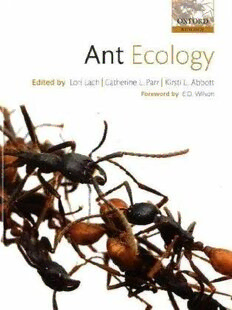
Ant Ecology PDF
429 Pages·2010·6.748 MB·English
Most books are stored in the elastic cloud where traffic is expensive. For this reason, we have a limit on daily download.
Preview Ant Ecology
Description:
Comprising a substantial part of living biomass on earth, ants are integral to the functioning of terrestrial ecosystems. More than 12,000 species have been described to date, and it is estimated that perhaps as many still await classification. Ant Ecology explores key ecological issues and new developments in myrmecology across a range of scales. The book begins with a global perspective on species diversity in time and space and explores interactions at the community level before describing the population ecology of these social insects. The final section covers the recent ecological phenomenon of invasive ants: how they move across the globe, invade, affect ecosystems, and are managed by humans. Each chapter links ant ecology to broader ecological principles, provides a succinct summary, and discusses future research directions. Practical aspects of myrmecology, applications of ant ecology, debates, and novel discoveries are highlighted in text boxes throughout the volume. The book concludes with a synthesis of the current state of the field and a look at exciting future research directions. The extensive reference list and full glossary are invaluable for researchers, and those new to the field.
See more
The list of books you might like
Most books are stored in the elastic cloud where traffic is expensive. For this reason, we have a limit on daily download.
